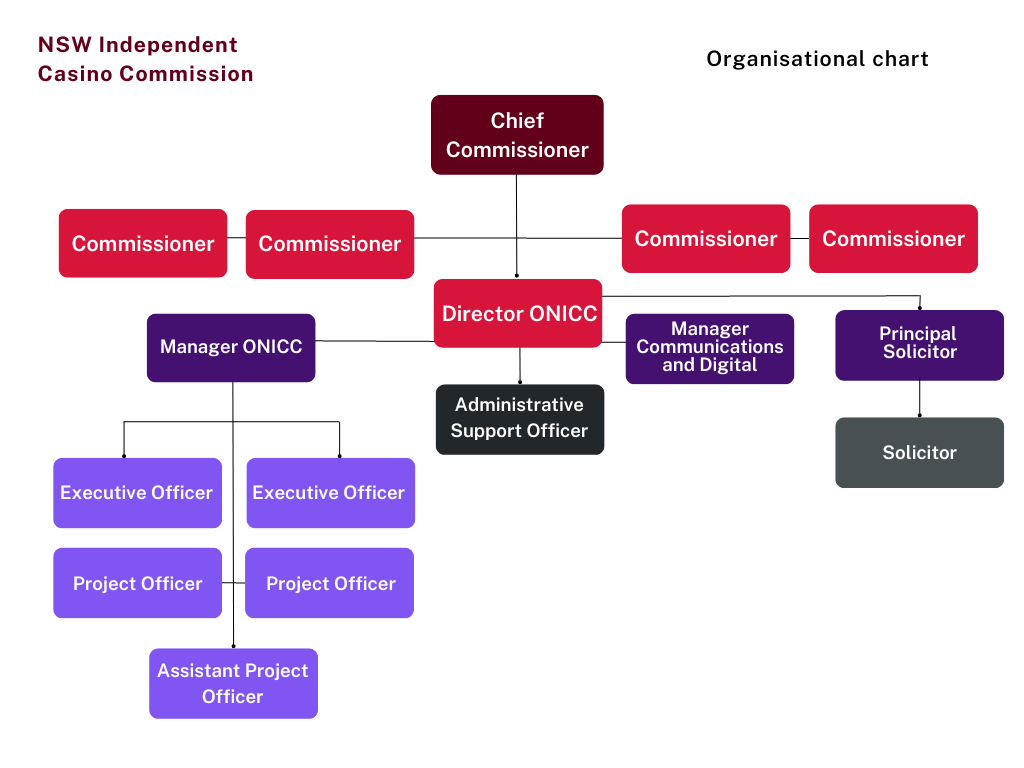About us
Find out who we are and how to contact us. Read the Agency Information Guide to find out what information we make available.
The NSW Independent Casino Commission is a statutory authority created in 2022, under amendments to the Casino Control Act 1992. The NICC was set up to address the risks and harms arising from casino operations through increased regulatory oversight.
The NICC plays a vital role in maintaining public confidence in the NSW casino industry through visible and robust supervision.
Vision
NSW casinos uphold community expectations through responsible and compliant operations that are resistant to criminal infiltration and equipped to minimise gaming-related harms.
Mission
The NSW Independent Casino Commission is an independent, effective and trusted casino regulator that minimises risks and harm and maximises the accountability of casinos.
NICC commissioners
Some of the NICC’s commissioners are former Independent Liquor & Gaming Authority board members who were on ILGA’s casino committee, overseeing the Crown Resorts remediation program and the Bell Review into The Star.
On 13 December 2024, the Minister for Gaming and Racing announced the NSW Government had appointed Christine Howlett as a new Commissioner of the NICC for a four-year term following a competitive recruitment process. Ms Howlett fills the vacancy created by the departure of Craig Sahlin who served as a NICC Commissioner from September 2022 to December 2024.
Philip Crawford - Chief Commissioner

Philip has practised as a solicitor in Sydney for more than 40 years. He was a leading practitioner in litigation, insolvency and restructuring, and alternative dispute resolution. Mr Crawford was Chairman of Partners at Sydney law firm, Henry Davis York. From 2013 to 2022 he ran his own mediation practice. He is recognised as one of Sydney’s leading mediators.
As Chairperson of ILGA (2016 to 2022), Mr Crawford played a key role in determining liquor and gaming related matters across the state. In this role, he commissioned the Bergin Report which led to a new framework for casino legislation in NSW. With the support of the NSW Government, Mr Crawford implemented Bergin's findings, including establishing the NICC in 2022. He also commissioned the Bell Inquiry into The Star and led the subsequent disciplinary response.
In his current role as Chief Commissioner of the NICC, Mr Crawford continues to work closely with Crown Sydney to develop and implement its remediation program. Mr Crawford is also continuing work on the implementation of Bell's findings in relation to The Star, including structural change around governance, anti-money laundering measures and corporate culture.
Murray Smith - Commissioner

Murray Smith is a professional non-executive company director and chartered accountant, with more than 30 years experience in the accounting profession.
As a leading insolvency practitioner and restructuring adviser, he was a founding partner of McGrath Nicol and a corporate recovery partner at KPMG.
Mr Smith has experience in a wide variety of industries including working with registered clubs and other hospitality businesses.
He was the former Deputy Chairperson of ILGA and was Chair of ILGA’s Crown committee throughout the Bergin Inquiry and Crown’s remediation program.
Janine Rolfe – Commissioner

Janine Rolfe is a professional non-executive director and brings more than 25 years of legal, governance and management experience across multiple sectors, including highly regulated industries and complex global businesses.
Ms Rolfe currently sits on the boards of Cynata Therapeutics Limited (ASX: CYP), Ambertech Limited (ASX: AMO) and Cloudwerx Holdings Pty Ltd.
Previously, Ms Rolfe was General Counsel & Company Secretary of Link Group. Prior to that, Ms Rolfe founded the governance consultancy, Company Matters (now MUFG Pension & Corporate Markets), and worked both as in-house counsel at Qantas and in private practice at Mallesons Stephen Jaques (now King & Wood Mallesons).
Ms Rolfe holds a Bachelor of Economics and Bachelor of Laws (Honours) from the University of Sydney and is a Graduate of the Australian Institute of Company Directors.
Christine Howlett PSM – Commissioner

Christine Howlett PSM is an experienced executive who joins the NICC with more than 30 years experience in public administration, corporate governance, regulation and stakeholder engagement.
From 2021 she served as Deputy Special Manager, independently overseeing Crown Melbourne’s remediation program following the findings of the Finkelstein Royal Commission, including reforms to prevent gambling harm and money laundering.
She holds a Master of Arts in Criminology and a Bachelor of Arts with Combined Honours from the University of Melbourne, as well as management qualifications from the Australian Graduate School of Management.
Ms Howlett is also a graduate of the Australian Institute of Company Directors. Her contribution to preventing social harm and promoting integrity was recognised with a Public Service Medal in the Australian Honours system in 2024.
Stephen Parbery – Commissioner

Stephen is a founder of national corporate advisory firm PPB Advisory. In 2016 he stepped down as chairman and partner to become a consultant to the firm and to pursue non-executive director roles.
Mr Parbery has been an advisor to governments acting in such matters as Ansett Airlines, HIH Insurance, ABC Childcare, Arrium Limited and Queensland Nickel.
He has also acted in some of Australia’s leading insolvency matters and he sits on a number of private company boards as well as undertaking corporate advisory assignments.
Mr Parbery has been Chair of both the former ILGA and now NICC Star Casino Committee overseeing the two Bell reviews, and was Chair of the Blackstone Probity Review Committee on the Crown takeover.
NICC Agency Information Guide
The Government Information (Public Access) Act 2009 provides members of the public with a right of access to government information.
Under the GIPA Act each NSW Government department and agency is required to publish an agency information guide.
This information guide provides a general description of:
- the NICC's structure and functions
- the way in which our functions affect members of the public
- how members of the public can provide feedback
- the kinds of information we hold
- information we make publicly available
- how to access NICC records.
The NICC is an independent statutory body constituted under the Casino Control Act 1992. It has powers and functions under the Casino Control Act 1992 and the Gaming and Liquor Administration Act 2007.
The NICC’s statutory functions under the Act include:
- carrying out investigations of a casino, its operations, and operators
- reviewing the suitability of casino operators and close associates
- monitoring compliance with the Act and legally binding mechanisms such as the regulations and internal control manuals
- determining casino and casino special employee licensing matters and proposals for new games
- determining disciplinary action against licensees and close associates
- reviewing certain delegated decisions made on its behalf by Liquor & Gaming NSW (L&GNSW)
- membership of the Casino, Liquor and Gaming Coordination Committee.
The NICC is funded by the Casino Supervisory Levy paid by both casinos and employs its own administrative staff, maintaining independent decision-making on licensing and disciplinary matters in casinos.
The NICC has four part time commissioners and a full-time chief commissioner. The Chief Commissioner is appointed by the Governor on the recommendation of the Minister. The Office of the NICC (ONICC) is a separate staff agency with a team of up to eleven staff, employed under the Government Sector Employment Act 2013.

The NICC is supported by specialist staff in L&GNSW. These staff assist the NICC to supervise casinos and exercise legislative functions under delegation. L&GNSW business units who work with the NICC include:
- Probity and assurance
- Intelligence and research
- Compliance, investigations and enforcement
- Licensing
- Policy
The NICC works with NSW Police and other regulators such as in response to potential and actual breaches, identifying excluded persons and sharing intelligence.
While our stakeholders are predominantly casino operators, employees and patrons, the general public can also be at risk of the harms arising out of casino compliance failures. Some of these harms include the direct impacts of gambling addiction, alcohol abuse and criminal infiltration. The NICC's ability to minimise these harms therefore has an impact on the wider community's wellbeing and safety.
The NICC understands that to a certain extent, casinos operate their licences under a social contract. Casinos must comply with the law to maintain support for their operations. The NICC encourages feedback and provides ways for stakeholders and the public to communicate with the NICC. Stakeholders and members of the public can:
- report a potential breach
- make a complaint
- make a suggestion or ask a question
- submit a media enquiry
- make an informal request for information
- make a formal GIPA application.
NICC records are managed in line with the NICC's legal obligations under:
- the Casino Control Act 1992, which requires certain records to be maintained
- the GIPA Act, which stipulates the provision of information in the public interest
- the State Records Act 1998 (NSW), which regulates the manner in which the NICC stores and disposes of government records.
Information about individuals who have applied for casino special employee licences and close associate approval is collected and assessed by L&GNSW on behalf of the NICC. The NICC is the final approver for these applications. Requests for personal information can be made under the GIPA Act or the Privacy and Personal Information Protection Act 1998.
Information about NSW casino operators and their businesses is collected in the course of the NICC's functions, sometimes via contracted third parties. This information includes reports, audits, investigations, reviews and inquiries conducted under the casino legislation.
Records such as draft documents, registers containing declarations for conflicts of interest, casino site visits and gifts and benefits are stored in the Office 365 file system. Final records are kept in Content Manager and include approved meeting minutes, board papers, email correspondence, directions to casinos, legal advice and invoices.
Open access information
The NICC publishes mandatory, open access information under the GIPA Act. This includes:
- NICC agency information guide
- NICC Charter
- NICC Code of Conduct and Ethics
- NICC Strategic Plan
- a register of government contracts
- documents tabled in Parliament
- policies that affect members of the public
- a disclosure log of information released under a GIPA decision
- a record of any open access information that is not made publicly available due to an overriding public interest against disclosure.
Proactive release
The NICC authorises the proactive release of information, where appropriate, to meet its objectives of open, accountable and transparent regulation. This includes:
- delegations of statutory functions
- terms of reference, hearing schedules, transcripts, and other information relating to public inquiries
- board meeting notices and outcomes
- board decisions including disciplinary action taken against casino operators, close associates and casino special employees
- information about casino reviews conducted under section 143 of the Act
- fact sheets, factual information, and reports
- NICC publications
- discussion/research papers
- guidelines and policies that relate to employment conditions and managing staff.
If information is not available on the NICC's website, members of the public can suggest information for proactive disclosure.
The GIPA Act provides members of the public with a right to access government information.
There are four ways that members of the public can access government information held by the NICC under the GIPA Act.
- Mandatory proactive release (open access information)
- Authorised proactive release
- Informal release
- GIPA applications
Informal release
Anyone can request any type of information from the NICC. The NICC will grant an informal release if the information is clearly in the public interest to disclose. The NICC may redact parts of the information or attach conditions such providing a view-only version where the requested information is sensitive and should remain confidential.
If you would like to make an informal request for records or information, please contact office@nicc.nsw.gov.au.
GIPA applications
Under GIPA, everything can be applied for and most records can be released. The Department of Creative Industries, Tourism, Hospitality and Sport (DCITHS) handles GIPA applications on behalf of the NICC.
To make a request for information held by NICC an access application must:
- be in writing and addressed to DCITHS
- clearly indicate that it is a formal access application made under the GIPA Act
- provide a payment of $30 (by cheque, money order or credit card)
- provide the name of the applicant and a postal or email address for correspondence in connection with the application
- include such information as is reasonably necessary to enable the government information applied for to be identified.
Review of a decision
You have the right to request a review of a GIPA decision. Please read the NSW Information and Privacy Commission’s publication Your review rights under the GIPA Act.
